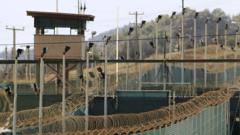The plea deals for Khalid Sheikh Mohammed and two co-defendants in the 9/11 terror attacks have been delayed after the US government filed an objection, stressing potential harm in accepting the agreements. The case continues to elicit strong reactions from victims' families amid over two decades of legal proceedings.
Plea Deals for 9/11 Plotters in Jeopardy After US Government Objection

Plea Deals for 9/11 Plotters in Jeopardy After US Government Objection
Khalid Sheikh Mohammed's guilty pleas are postponed due to the US government's objections to plea agreements, sparking controversy and mixed reactions from victims' families.
In a significant turn of events, the plea agreements of Khalid Sheikh Mohammed, the alleged mastermind behind the 9/11 attacks, and two co-defendants faced a setback when the US government intervened to block their expected guilty pleas. Initially set to plead guilty on Friday, the defendants had reached an agreement last July to accept responsibility for their roles in the attacks, which would spare them from facing the death penalty.
The Justice Department, in a filing with a federal appeals court, argued that allowing the pleas to proceed would deprive them of the opportunity to pursue capital punishment against those accused of a horrific crime that resulted in thousands of deaths and reverberated globally. The court concurred, announcing that it required more time to examine the merits of the government's challenge and put the proceedings on hold.
This ruling follows earlier rejections by a military judge and appeals panel regarding attempts by Defense Secretary Lloyd Austin to retract the plea agreements that had been sanctioned by a high-ranking official he appointed. Families affected by the tragedy have expressed their views on the plea deals; some criticized them as excessively lenient, while others viewed them as a necessary step toward advancing a protracted case.
Since the September 11, 2001 attacks — which left almost 3,000 people dead after hijackers targeted the World Trade Center and the Pentagon — the three defendants have spent over 20 years in US custody. Moreover, the pre-trial hearings have dragged on for more than a decade, primarily dealing with the controversy over the treatment of the defendants during their time in CIA custody, where they were subjected to torture techniques such as waterboarding.
Families of the victims continue to grapple with the implications of the plea deals. While Terry Strada, who lost her husband in the attacks, labeled the agreements as concessions to the detainees, others like Stephan Gerhardt expressed frustration over the delayed process. Gerhardt, who journeyed to Guantanamo Bay to witness what he hoped would be a pivotal moment in justice, acknowledged the necessity of eventually convicting the accused to prevent a scenario where they might die without formal accountability.
The Justice Department, in a filing with a federal appeals court, argued that allowing the pleas to proceed would deprive them of the opportunity to pursue capital punishment against those accused of a horrific crime that resulted in thousands of deaths and reverberated globally. The court concurred, announcing that it required more time to examine the merits of the government's challenge and put the proceedings on hold.
This ruling follows earlier rejections by a military judge and appeals panel regarding attempts by Defense Secretary Lloyd Austin to retract the plea agreements that had been sanctioned by a high-ranking official he appointed. Families affected by the tragedy have expressed their views on the plea deals; some criticized them as excessively lenient, while others viewed them as a necessary step toward advancing a protracted case.
Since the September 11, 2001 attacks — which left almost 3,000 people dead after hijackers targeted the World Trade Center and the Pentagon — the three defendants have spent over 20 years in US custody. Moreover, the pre-trial hearings have dragged on for more than a decade, primarily dealing with the controversy over the treatment of the defendants during their time in CIA custody, where they were subjected to torture techniques such as waterboarding.
Families of the victims continue to grapple with the implications of the plea deals. While Terry Strada, who lost her husband in the attacks, labeled the agreements as concessions to the detainees, others like Stephan Gerhardt expressed frustration over the delayed process. Gerhardt, who journeyed to Guantanamo Bay to witness what he hoped would be a pivotal moment in justice, acknowledged the necessity of eventually convicting the accused to prevent a scenario where they might die without formal accountability.


















